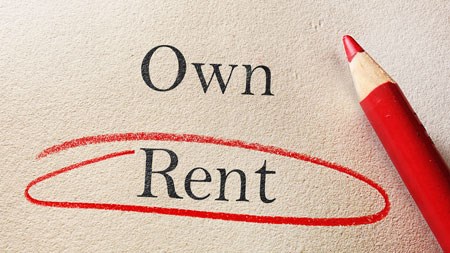Reporter: For some, buying a new house or apartment doesn't quite fit into their budget, so naturally the next option is renting. Let's take a look at what right you have as a potential tenant, and how this process works. So where exactly is the renting market like at the moment? Where does private property sit?
Simon Bray: The renting market is just as hot as it's ever been in South Africa. We see a lot of the market on Private Property. We see the listings coming on every day. We've seen hundreds more rental properties coming on to the platform in the last few months and I think it's just the market shifting slightly. A lot of the first world markets around the world are rental first, and certainly the property market in South Africa has been a buy first market - but issues around affordability, issues around "how safe is my property investment these days", areconvincing people that renting is a better option. So it's really, really hot right now, I mean there are fifty tenants for every landlord on the Private Property system. Unbelievable demand.
And like you said, renting is all about the idea of affordability. What are some of the benefits of renting over buying?
Simon Bray: Obvious benefits are things like flexibility and affordability. We still have a market where it's much cheaper to rent in the areas you want to live, than buy. So, if you have budget constraints of any kind, it obviously makes sense to look at renting. Obviously you're not building up that long term asset, because you're paying somebody else over a period of time, but it is still much more affordable to rent. And then there is this concept of flexibility. Our lives are shifting so quickly these days. This concept of stability that people had maybe 10, 20 years ago is not nearly the same. You might pick up and move, you might get in a new relationship, new job, whatever the case might be. And so the flexibility of being able to up and leave within a couple of months is a great solution.
Something I've noticed, particularly in our country, in South Africa, and it's a beautiful nation I think one of the things is that the law sometimes seems to feel a little bit distant to the average person, and I'm sure when it comes to renting or buying, the legalities around that tend to be quite blurry. People don't really know what their rights and responsibilities are. Do you have any comments on that?
Simon Bray: I think the truth is, the law's pretty straightforward, it's pretty simple, but a lot of people just don't know what their rights are. We've got an advice platform that deals with all sorts of questions and all sorts of queries, and the most searched for issues are around rentals. What deposit should I pay? What should my lease agreement say? What do I do if a tenant doesn't pay? Is there an eviction process that I should be aware of? People are desperately searching for that kind of information . And I think it is because it's a murky world. You go from one landlord to the next and some times you're treated differently and you don't know exactly what your rights are.
And prices across areas vary so differently that you never really know what's the right value for a specific area. Tell us more about the idea of renting and the legalities around it. What should we look for when it comes to starting to rent something?
Paul Stevens: I think the most important thing with tenants to try and assist before you rent a property is: Do you have an impaired credit history? And we are finding in the market at the moment that close to 50% of tenants that are applying for a place aren't qualifying, just simply due to their impaired credit history. Generally people are going to know that they've got an impaired credit history, so they need to go and deal with it. Go and see an attorney and get it sorted out. It's not difficult. Make sure you get it behind you, because whether you're renting or buying a property,this is going to hold you back. Sort that out first and foremost. Once that's sorted out, you can start tackling the simple things like what is the most important - you mentioned it earlier - Simon, is affordability, you have got to ensure that you can afford a place. Don't take a place that you can't afford. And very often people approach a rental agency dreaming of living in Camps Bay, but they can afford to live in City Bowl. So it's actually a very simple mathematical equation that we use as rental agencies, where basically you take your net income after taxes and 30% of that can be used, as a general term towards your rental. As a simple sum of R3,000 rental. Very simple but use a professional agency, and let them advise you, and most importantly - and that came up earlier in our conversation - is location, and that's a very simple assessment. You'll want to live close to schools if you've got children. You want to live in close proximity to a transport route if you don't have transport.
I think those are really lifestyle questions, but the big one that people come up with the legalities around it. I think lease arrives in your email inbox to have a look through and says, "Approve this lease, sign it", and you never know what to look for, I think. What are some of the things we should be focusing on when we receive that lease for the first time. How does that process go. Do I have a say? Do I have rights? Are there basics that should be in every lease?
Paul Stevens: Absolutely I think first and foremost, and that's where a little stumbling block comes with a lot of tenants that rent from a private landlord. It's not legal that it has to be in writing. A lease agreement can be a verbal agreement. But ensure that it's in writing. If things are verbally discussed, even if it's a parking bay, or something about the alarm. If you've negotiated this, ensure that it's down in the terms and conditions, even if it's special conditions later, because issues do arise, and they often arise at a later point when everyone's forgotten what they'd negotiated or discussed earlier. So first and foremost, make sure it's in writing. Then there's simple conditions like the rental amount. Is that all on you to pay, or are there other amounts I have to pay? Do I have to pay for the alarm? Do I have to pay levies? Do I have to pay the rates and taxes? Generally, a lot of those costs are associated with the landlord. So know your rights. A lot of this is available online. You can go, as Simon said, not just on Private Property. You can go and Google Rental Housing Act, and very clearly there it stipulates who is right. So ensure you're not being hoodwinked with costs, because very often they are also costs, even when dealing with a reputable rental agency such as ourselves you need to ensure that you are well aware of what costs come, particularly when things don't go right and you're wanting to move. You're getting transferred now. It is becoming a small world. So next month you transfer to another country, you need to give notice. There are penalty causes. So make sure you understand it and with the CPA, which is a new law that was passed a few years ago, a lease agreement needs to be clear and understood, and even though it is, your lay person very often can't understand it. So ask and understand before you land yourself in trouble.
Simon Bray: I think that's the key. Ultimately it's a contractual relationship between two parties, so the landlord and tenant are saying, "This is the framework that we're going to govern our relationship based on," so you absolutely have the right to negotiate things up front. Do you want additional security before you move in? Do you want an aircon and there's not yet an aircon provided? It's not the type of thing you really want to wrangle with months down the line. You actually want to deal with that at the beginning: how's it going to get paid for? When is it going to get installed? Just put it in the lease.
Exactly. And what's nice about your two platforms, is you do have an option to go and find this information out. You are not left in the dark. You can go and find out, so use the resources that are available to you.
Paul Stevens: I think the single biggest thing I'd like to point out at this stage of what we see, almost 95% of the issues that arise are around a deposit. A deposit is a huge thing for your average tenant. He's often having to place a deposit and the first month's rental, while his deposit is still locked up with another agency. Then the tenancy ends, and there's always a dispute around, "What amount do I get paid back?". If they understand very clearly from the onset, what they need to do so, they have got to bring the property back to the condition that it was, taking fair wear and tear into account. And I think that always leads to miscommunication. Where they don't understand, "Why don't they just do it themselves?" Clean the carpets. As soon as the agency is put in a place, or the landlord, to paint the place, to clean the carpets, and then the tenant wants to argue about well , "I've been overcharged here." I think, again comes back to understanding what you can do and what you can't.



